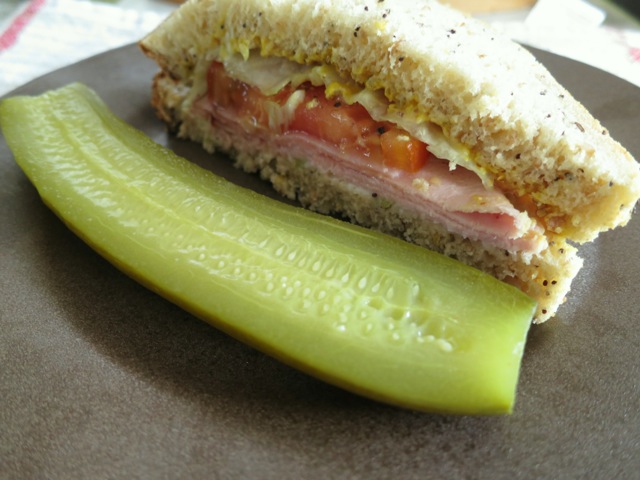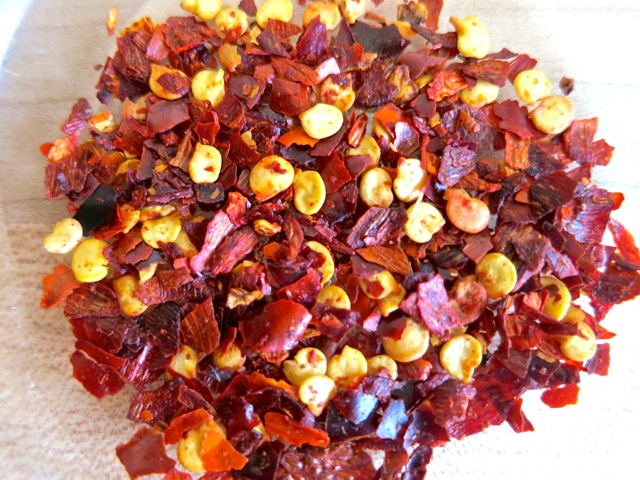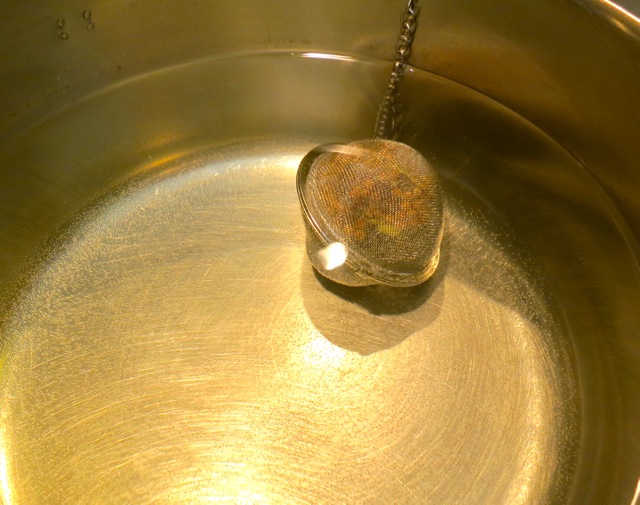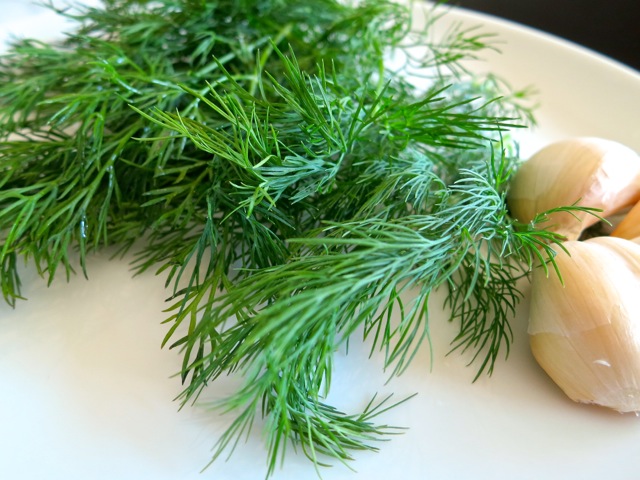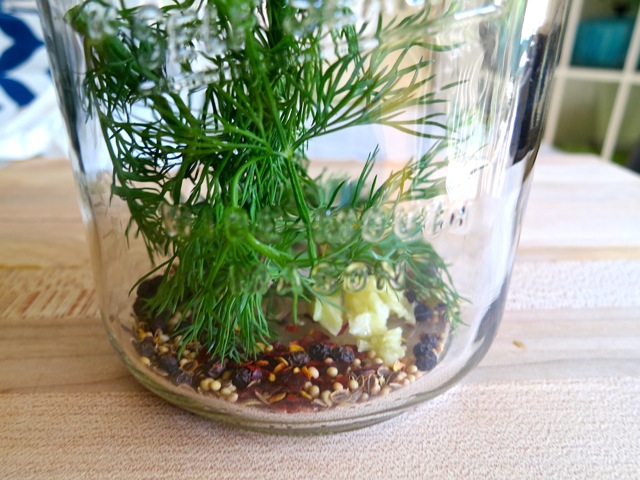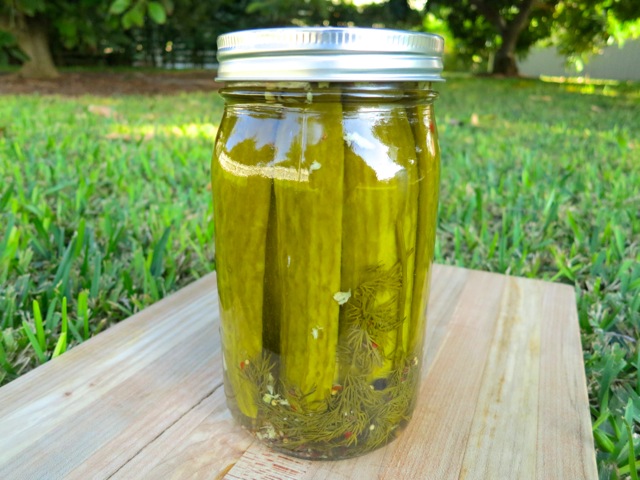 Pickles, pickles, pickles. I can’t live without them. Crunchy, tangy, salty, dilly, best chilled and served alongside a sandwich.
Pickles, pickles, pickles. I can’t live without them. Crunchy, tangy, salty, dilly, best chilled and served alongside a sandwich.
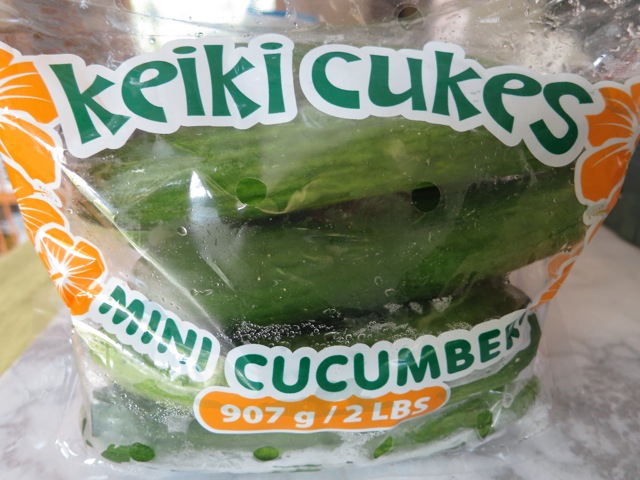 John’s grandmother, Ida, made terrific dill pickles. Unfortunately, her recipe was lost. With the memory of those pickles in mind, he has been determined to make his own dills ever since. He used to grow cucumbers specifically for pickle making. Unfortunately the garden pests were fond of them too. Most destructive are the pickle worms that burrow into the poor little cukes. It’s very frustrating to have spent so much time nurturing your plants only to have them destroyed. Now that our local Costco sells these Keiki Cukes, we’re in business again. These crunchy cucumbers are perfect for pickles.
John’s grandmother, Ida, made terrific dill pickles. Unfortunately, her recipe was lost. With the memory of those pickles in mind, he has been determined to make his own dills ever since. He used to grow cucumbers specifically for pickle making. Unfortunately the garden pests were fond of them too. Most destructive are the pickle worms that burrow into the poor little cukes. It’s very frustrating to have spent so much time nurturing your plants only to have them destroyed. Now that our local Costco sells these Keiki Cukes, we’re in business again. These crunchy cucumbers are perfect for pickles.
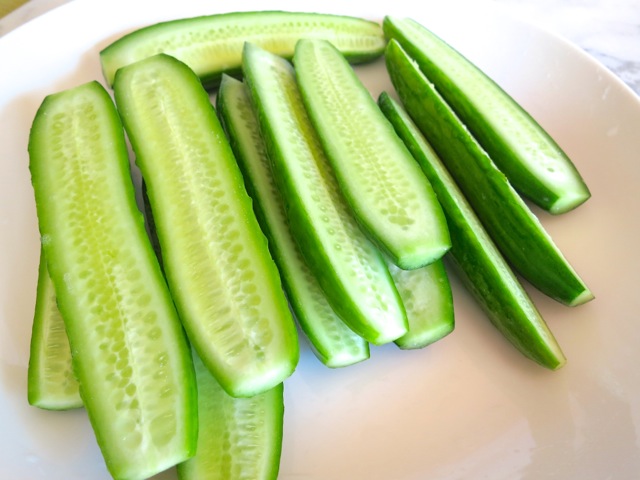 Beautiful mini cucumbers with tender skin and few seeds.
Beautiful mini cucumbers with tender skin and few seeds.
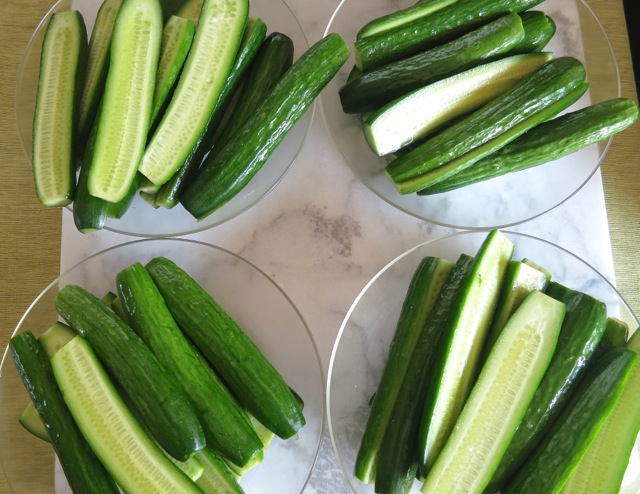 It is best to have your mise en place ready. Divide up the cucumbers for each jar so that you can work quickly to get the jars into the water bath canner.
It is best to have your mise en place ready. Divide up the cucumbers for each jar so that you can work quickly to get the jars into the water bath canner.
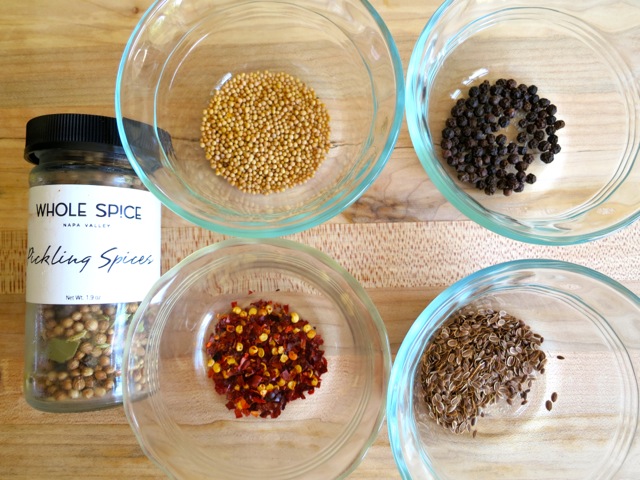 The pickling spice is optional but it does add a nice flavor to the brine. If you don’t have a tea ball you may use cheese cloth.
The pickling spice is optional but it does add a nice flavor to the brine. If you don’t have a tea ball you may use cheese cloth.
Homemade Dill Pickles
Makes 4 Quart Jars
Ingredients for pre-brine (optional)
3 quarts distilled or filtered water
5 tablespoons pickling salt
Ingredients for the brine
4 cups white vinegar
4 cups distilled or filtered water
2 tablespoons + 2 teaspoons pickling salt
2 teaspoons calcium chloride, AKA “Pickle Crisp” (optional)
3 tablespoons mixed pickling spice (in a tea ball or cheese cloth)
Ingredients for the jars
4 1/2 pounds Keiki Cukes or other pickling cucumbers (about 18 ounces per jar)
4 teaspoons yellow mustard seeds
4 teaspoons black peppercorns
4 teaspoons dill seeds
2 teaspoons red pepper flakes
4 garlic cloves, crushed
4 large sprigs of fresh dill
Preparation
Wash cucumbers. Trim ends for uniformity and slice in half lengthwise. At this point, one option is to pre-brine the sliced cucumbers overnight in 3 quarts distilled or filtered water mixed with 5 tablespoons pickling salt. This is recommended but not required. It does make for a crisper pickle. To portion the cucumbers for each jar, use an empty quart mason jar and snuggly pack with the cucumber slices. Remove slices and place in individual bowls and set aside.
Wash jars and place them in boiling-water canner. Fill the jars and canner with water to the top of the jars. Cover and bring water to a simmer over medium heat, do not boil. Prepare the two-piece closures. Wash lids and place in a small saucepan and cover with water. Heat to just a simmer but do not boil. Do not heat screw bands.
Place brine ingredients in a large saucepan and bring to a boil, turn down the heat and simmer for 5 minutes.
Lift the canner jar rack and fix into place on the rim of the canner. Remove one jar at a time from canner and empty hot water back into the canner. Place jar on a cutting board. Place 1 teaspoon each of yellow mustard seeds, black peppercorn, dill seeds, 1/2 teaspoon red pepper flakes as well as 1 crushed garlic clove and 1 large sprig of fresh dill. Pack cucumbers into jar to within a generous 1/2 inch of top of jar. Place a canning funnel in the jar. Ladle hot brine into jar leaving 1/2-inch head space. Remove air bubbles (with a chopstick or similar utensil) and adjust headspace, if necessary, by adding more brine. Wipe jar rim. Using a magnetic utensil, lift hot lid from water, center it on the jar and place screw band on jar. Tighten screw band evenly and firmly just until resistance is met. Then increase to fingertip tight. Do not over tighten. Return jar to canner rack. Continue filling jars individually until all jars are filled, lower rack into canner and ensure that all jars are covered by 1 inch of water. Cover canner and bring water to a full boil over high heat. Process for 15 minutes, starting timer only when water reaches a full boil.
Remove jars from water, and let stand, undisturbed, at room temperature 24 hours. To check seals, remove the bands, and press down on the center of each lid. If the lid doesn’t move, the jar is sealed. If the lid depresses and pops up again, the jar is not sealed. In the event that a jar does not seal, simply refrigerate it. Store properly sealed jars in a cool, dark place up to 1 year (date your jars on the bottom with a Sharpie pen) Refrigerate after opening.

